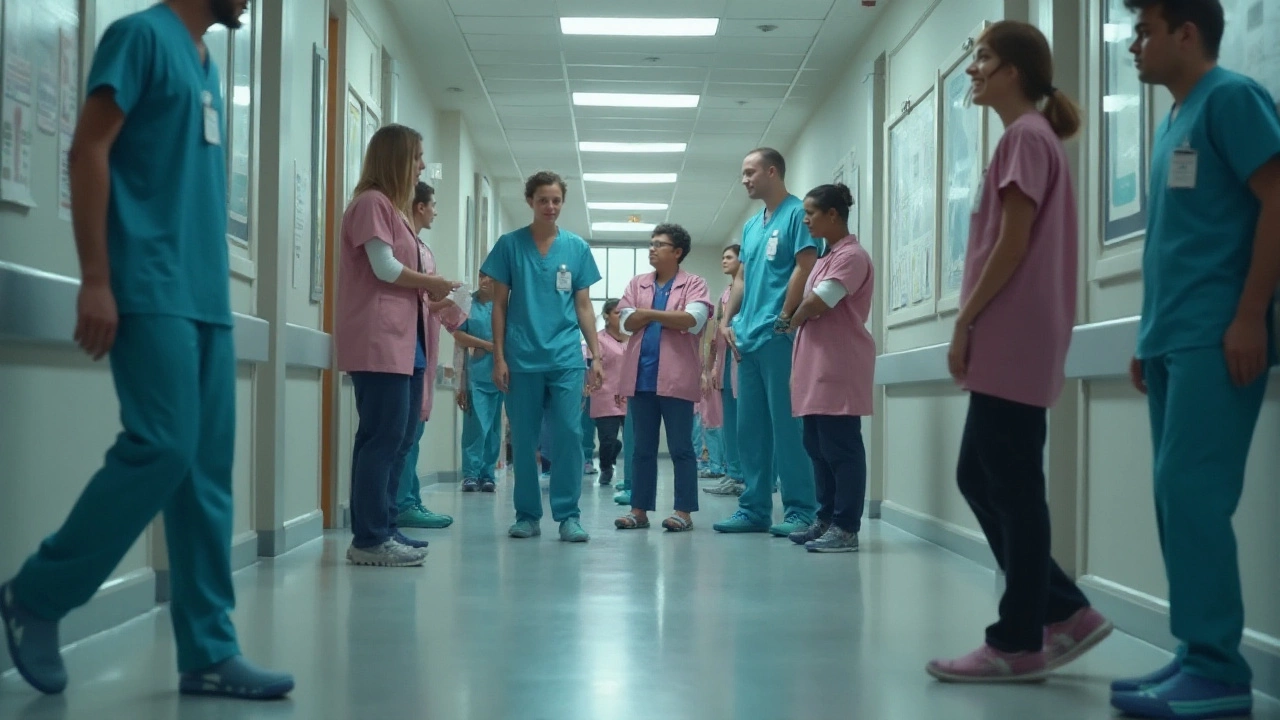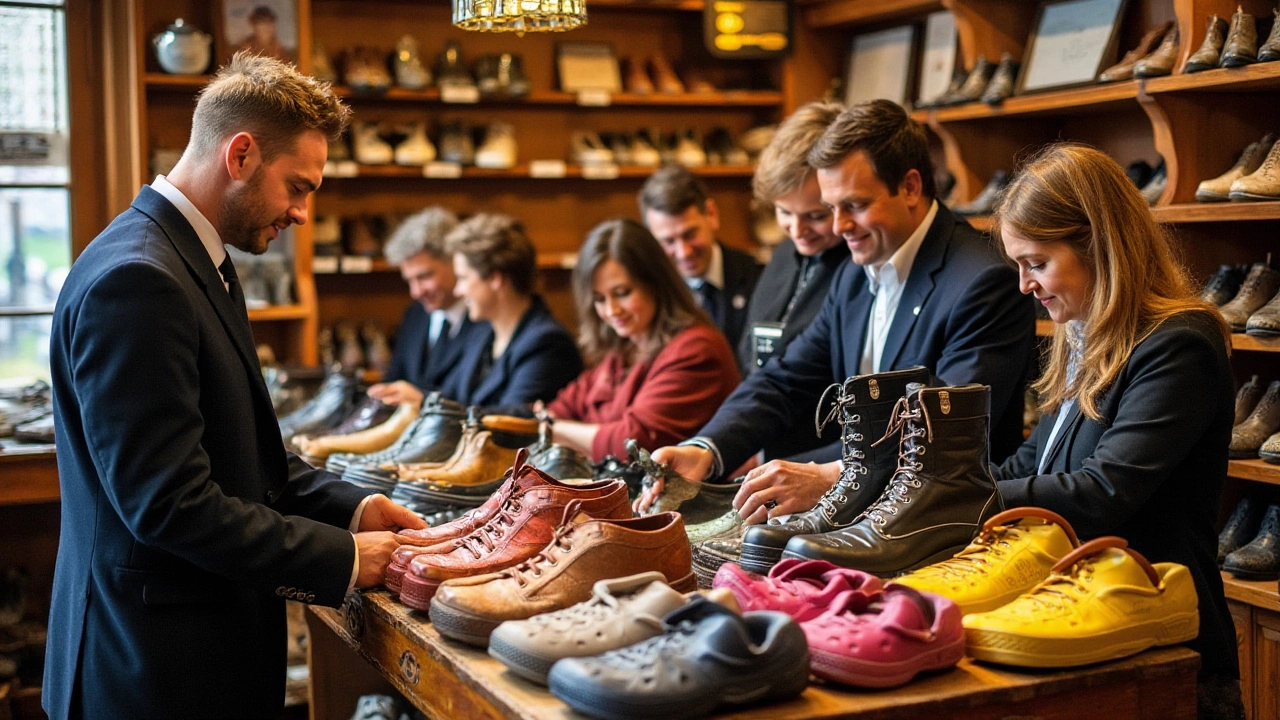In Ireland, Crocs have become a beloved footwear choice, renowned for their comfort and quirky style. Their widespread adoption spans from the bustling streets of Dublin to the serene coastal towns. Yet, as they make their way into workplaces, the question arises: are Crocs truly suitable for professional settings?
The debate over Crocs in the workplace isn't just about fashion – it's about practicality and safety. With many industries in Ireland upholding strict health and safety standards, the suitability of Crocs is under scrutiny. Are they a convenient choice or a potential hazard?
We'll dive into the cultural and regulatory landscape unique to Irish workplaces, examining whether these brightly colored clogs could breach health codes. This insight will help you decide if Crocs can comfortably find a place in your work wardrobe or if it's time to consider alternatives that match Ireland's workplace expectations.
- The Popularity of Crocs in Ireland
- Health and Safety Concerns
- Regulations and Workplace Norms
- Alternatives and Best Practices
The Popularity of Crocs in Ireland
In Ireland, the rise of Crocs as a favored choice of footwear reflects not just a fashion statement but an emblem of comfort and convenience. This trend can be traced back to a broader international enthusiasm for these distinctive foam clogs, initially popular among healthcare workers and professionals who spent long hours on their feet. Over time, Irish consumers have embraced Crocs for their versatility, as they transition seamlessly from outdoor activities to casual office settings.
The unique design of Crocs, distinguished by their highly recognizable perforated exterior, and vibrant colors, has caught the eye of both young and older Irish folks alike. In bustling urban centers like Dublin and Cork, you might find them worn by commuters, students darting between lectures at Trinity College, or locals meandering through St. Stephen's Green on a rare sunny afternoon. The appeal of Crocs lies not just in their airy, lightweight property but in their ability to offer a splash of color against the often grey Irish skies.
Interestingly, a survey by the Irish Times in 2022 revealed that 47% of young adults in Ireland own at least one pair of Crocs, illustrating their growing prominence in Irish shoe collections. Beyond their playful appearance, the practicality of work shoes that can withstand Ireland’s notorious rain makes them a logical choice for many. Many Irish parents also choose Crocs for their kids due to their easy-clean nature and durability, perfect for the unpredictable weather synonymous with Irish life.
While Crocs enjoy a laid-back image, there’s an underlying practicality that endears them to the Irish ethos of blending function with form. Whether it's walking along the Wild Atlantic Way or navigating the cobblestone streets, the comfort Crocs provide is unmatched by other casual footwear. A notable footwear retailer in Dublin mentioned in an interview, "With their ease of use and quirky style, Crocs have found a solid footing in the Irish market, defying seasonal trends and practical challenges alike."
The love for Crocs in Ireland is also fueled by the local trend towards sustainable fashion. Many Croc models are made with eco-friendly Croslite material, aligning with the national push towards greener consumer choices. This adds another feather to Crocs’ cap as the environmental consciousness among the Irish population increases. Yet, as these amphibious clogs stride confidently across the country, questions linger on their suitability in professional environments. This juxtaposition of casual comfort and workplace appropriateness sets the stage for ongoing debates among Irish office-goers and health inspectors alike.

Health and Safety Concerns
When considering the use of Crocs in Irish workplaces, safety and health implications often become a focal point. These lightweight shoes, made from a proprietary foam resin, offer comfort and breathability, making them a perennial favorite among certain professions. However, they come with a set of concerns largely due to their open design and lack of substantial support. For workplaces such as hospitals, kitchens, and factories, where sharp objects, heavy equipment, and slippery surfaces are commonplace, Crocs may not meet the safety standards required. The very features that provide comfort can, unfortunately, compromise protection, leaving wearers vulnerable to injuries like lacerations or slips and falls.
In a country known for its rapidly changing weather conditions, the situation could become hazardous. Imagine a rainy day in Galway; water seeping into the workspace can transform a normally stable environment into a slippery hazard. Here, Crocs might fail to provide the grip necessary to prevent accidents. It is not uncommon for workplaces to demand closed-toe shoes with non-slip soles to prevent such incidents. Official guidelines often suggest footwear that includes more robust materials and design to ensure the safety of workers under various conditions. In fact, studies have shown that inappropriate footwear is a significant contributing factor in workplace injuries, underlining the need for more sensible options in places where safety cannot be compromised.
Crocs have been marketed by some as offering excellent grip and being suitable for wet environments, due to their design. Yet, many employers and safety experts emphasize that these claims do not always translate to industrial or professional settings. For instance, the unique composition of Crocs does not guarantee the level of traction needed on different types of flooring materials commonly used in Ireland's public and commercial spaces. In environments like hospitals or nursing homes, where employees often traverse miles of tiled corridors daily, footwear that fails to provide adequate support can lead to chronic issues such as foot pain and plantar fasciitis. Therefore, ensuring that footwear provides both structural support and anti-slip features is crucial in preventing worker dissatisfaction and potential injury.
Moreover, considering Ireland's work regulations, which sometimes align with broader EU safety directives, businesses must ensure their dress codes meet both local and international standards. Crocs, though casual and comfortable, might not always fit the bill, especially in sectors where high safety standards are mandated by compliance laws. The Health and Safety Authority (HSA) of Ireland offers specific details and recommendations that guide companies across various sectors on the suitable types of work attire, aiming to minimize on-the-job risks.
"Footwear that compromises safety isn't merely a personal risk; it poses a business liability," quotes an industry safety consultant cited at a Dublin Occupational Safety and Health Convention.Such insights compel a re-evaluation of footwear policies to ensure both comfort and compliance are harmonized effectively.
In summary, while Crocs present an appealing option for their lightweight and comfortable features, they necessitate a thorough examination against the backdrop of health and safety requirements specific to Ireland's working environments. Balancing employee comfort with safety remains a priority, urging both employees and employers to choose footwear wisely, always considering the specific demands of their workplace and the prevailing conditions that could influence safety outcomes.

Regulations and Workplace Norms
In Ireland, as in many countries, workplace safety regulations are a key concern for both employers and employees. The wearing of suitable footwear is often a cornerstone of these regulations, aiming to prevent accidents and injuries in the workplace. The Health and Safety Authority (HSA) in Ireland provides guidelines which emphasize that employers must ensure employees are not only safe but also appropriately attired for their specific work environment. This is where the discussion about Crocs as work shoes becomes particularly relevant.
The versatility and comfort of Crocs have made them popular across various sectors, from hospitality to healthcare. Despite their popularity, safety experts often question their appropriateness, particularly in settings where slipping or falling objects are potential hazards. Crocs, with their plastic build and open-hole design, may not provide adequate protection against heavy or sharp objects, and their grip on wet surfaces is sometimes less than ideal. In sterile environments, such as hospitals, the easy-to-clean nature of Crocs is appreciated. However, the lack of coverage can contradict hygiene protocols that demand more enclosed footwear.
According to a report by the Irish Health and Safety Authority, "Footwear should be chosen not just for comfort but also for adequate protection and support, especially in hazardous environments."
Employers in Ireland generally have the authority to decide what type of footwear is suitable for their employees, provided it aligns with safety requirements. In construction and industrial settings, steel-toed boots are usually mandated, whereas in office environments, the rules might be more relaxed. However, it's crucial for companies to consider not just the regulations but also the workplace culture and employee comfort. Balancing this triad can be tricky, but smart companies find ways to accommodate fashion trends while maintaining safety standards. For instance, allowing Crocs in casual settings or during non-operational hours can be a compromise.
Understanding these norms and regulations helps employees navigate their footwear choices effectively. For those in sectors with stringent safety standards, it is important to consult with safety officers before bringing Crocs to work. These norms may vary significantly depending on the industry and the specific Irish region. As businesses adapt to evolving safety standards, it remains essential to stay updated on these changes to ensure compliance and safety in the workplace.

Alternatives and Best Practices
When it comes to selecting the right work shoes for the diverse weather and working conditions in Ireland, it's imperative to weigh comfort against safety. While Crocs might be a tempting choice for their casual appeal and ease of wear, certain workplace settings demand more fortified options. Industries such as healthcare, hospitality, and construction often require shoes that provide slip-resistance, toe protection, and ankle support. For those spending long hours on their feet, shoes with cushioned soles and arch support can help prevent discomfort and long-term injuries. To stay compliant with Irish workplace regulations, it might be prudent to consider shoes that balance these safety features with comfort and style.
For those in healthcare, options like sturdy clogs or slip-on medical shoes with anti-static properties can be both stylish and safe. These shoes often come with washable surfaces, ensuring hygiene is maintained, which is a critical concern in medical settings. If you work in a more formal environment, leather shoes that incorporate cushioning and breathable materials can keep your feet comfortable during long business hours while maintaining a professional look. Workers in construction or manual labor will need to prioritize steel-toed boots that meet safety standards, providing critical protection against heavy objects or compression injuries. The traditional Wellingtons remain a favorite for those tackling the wet Irish landscape, offering waterproof protection and warmth.
Adopting best practices for workplace footwear involves not just choosing the right shoe but also maintaining them properly. Regular cleaning, checking for wear and tear, and replacing shoes when they no longer provide adequate support or protection can save you from potential health issues. It's interesting to note statistics showing that investing in high-quality shoes can reduce workplace injuries by a significant percentage, as it directly contributes to better posture and reduces stress on the feet and joints. As the Irish winter looms, look for shoes with insulating and water-resistant properties to keep the chill and rain at bay, yet remember to balance practicality with the comfort necessary for a long workday.
Adding to the insightful point made by a noted Irish podiatrist,
"Foot health is critical not just for personal comfort but for professional performance as well,"it becomes clear why prioritizing the right work shoe is as much about care for oneself as it is about meeting workplace standards. Embrace these best practices and alternatives to protect your health while keeping step with the dynamic demands of the Irish work environment. Selecting shoes thoughtfully can enhance productivity, reduce stress, and ensure that your stride is confident, both on the job and beyond.
